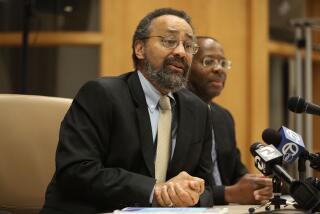John Hart Ely, 64; Constitutional Law Scholar and Author Was Often Cited by Legal Experts
- Share via
John Hart Ely, an influential constitutional law scholar and author who taught at Yale, Harvard and Stanford, where he served as dean of the law school from 1982 to 1987, has died. He was 64.
Ely died Oct. 25 in Miami of cancer. He had taught at Stanford until 1996, when he moved to Florida as the Richard A. Hausler Professor of Law at the University of Miami.
One of the most often cited legal experts, Ely was probably best known for the first of his three books, “Democracy and Distrust: A Theory of Judicial Review.” Published in 1980, the book focused on the role of the U.S. Supreme Court in interpreting the Constitution and was dedicated to his mentor, Chief Justice Earl Warren.
“Democracy and Distrust” earned the Order of the Coif award as the best book about law published from 1980 to 1982 and was listed by the Journal of Legal Studies as the single book -- of those published between 1978 and 2000 -- most frequently cited by lawyers in their own work.
“Very few legal scholars get to write a classic book and watch a whole generation absorb it,” said Stanford Law School Dean Kathleen M. Sullivan last week. “ ‘Democracy and Distrust’ is a masterpiece that combines elegant theory, raffish wit and a heartfelt search to get the role of the Supreme Court in American democracy just right.”
A liberal Democrat, Ely impressed scholars and the public with the seminal book but angered critics on both the political right and left. He wrote that the judiciary’s role was to assure democracy with an open and fair political process -- without focusing solely on original intent of the drafters of the Constitution or inferring moral rights and values from the document’s wording.
Conservatives claimed Ely merely provided a way for judges to impose their own wishes; leftists said that the author failed to protect such fundamental rights as the right to privacy.
Ely’s other books were “War and Responsibility: Constitutional Lessons of Vietnam and Its Aftermath” in 1993 and “On Constitutional Ground” in 1996.
Although he published only three books, Ely also was respected for his more than two dozen articles on such hot-button issues as flag desecration, abortion and reverse discrimination. He supported the availability of abortion as a matter of policy, but Ely stated in one of those articles that the landmark 1973 decision Roe vs. Wade, which legalized abortion, was “not constitutional law and gives almost no sense of an obligation to try to be.”
New York lawyer Daniel J. Kornstein, in reviewing Ely’s book “War and Responsibility” for the New York Law Journal, called the book a “splendid volume” that uses Vietnam as a springboard to analyze constitutional power for who -- Congress or the president or both -- can commit the U.S. to war.
Kornstein, who said he had consulted Ely when he was drafted for the armed services in 1969, said his former Yale professor “gives us the mature, ripened intellectual fruit of at least a quarter century’s thought and reflection by a leading constitutional law scholar on the most divisive public issue of my youth, the Vietnam War.”
Born in New York City, Ely graduated from Princeton and earned his law degree from Yale. He spent one law school summer clerking for future Supreme Court Justice Abe Fortas in Washington, drafting a brief that evolved into a Supreme Court decision providing government-funded legal representation for poor people accused of major crimes.
After graduation, the new attorney became the youngest of 17 staff lawyers for the Warren Commission, which investigated the assassination of President John F. Kennedy. Ely, who taught a course at the University of Miami in 2000 on the shooting, remained convinced that Lee Harvey Oswald was the lone gunman, but believed the CIA withheld information from the commission that might have indicated that others were involved.
After clerking for Chief Justice Warren, Ely spent a year as a Fulbright scholar at the London School of Economics and then moved to San Diego, to work for Defenders Inc., a nonprofit group defending indigent criminal defendants.
Ely taught at Yale from 1968 to 1973 and at Harvard from 1973 until 1982, with time out for a brief stint as general counsel to the U.S. Department of Transportation.
When he was interviewed shortly after arriving at Stanford in 1982, Ely was described by a Times writer as projecting “a sort of bumbling absent-minded professor image belied only by his articulate speech patterns and the framed pictures of his heroes on his office wall: Abraham Lincoln and Earl Warren.”
As the Stanford law dean, Ely continued to exercise his support for public interest law by introducing loan repayment assistance programs for students who took employment at nonprofit legal organizations. He worked to revitalize the curricula for second- and third-year law students, which he had once called “a boring wasteland.”
Ely is survived by his wife, Florida state Judge Gisela Cardonne Ely; two sons, Robert of New York, and John of Washington, D.C.; and two grandchildren.
More to Read
Sign up for our Book Club newsletter
Get the latest news, events and more from the Los Angeles Times Book Club, and help us get L.A. reading and talking.
You may occasionally receive promotional content from the Los Angeles Times.








